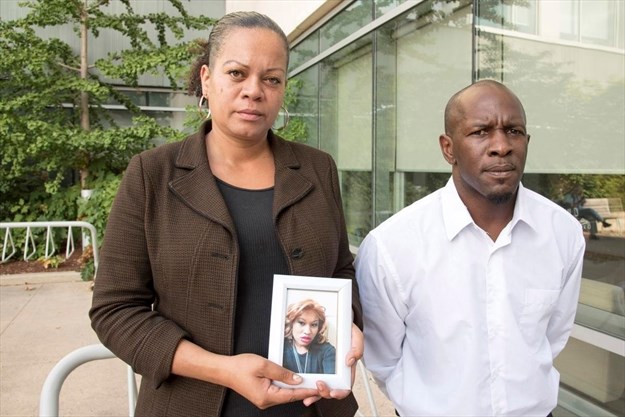A woman who was clinically brain dead, and whose family took their fight to keep her on life-support to court, has died. Taquisha McKitty was 28 and died on Monday morning.
The Brampton woman died of natural causes and had been on life support for more than 15 months.
Doctors had declared her “dead by neurological criteria” on Sept. 20, 2017, one week after she was found unconscious on a Brampton sidewalk following a drug overdose.
The Brampton mother has spent the better part of the past year-and-a half in Brampton Civic Hospital’s intensive care unit, while her family challenged the legal definition of death and fought to keep her on life support. Her father, Stanley Stewart, says she passed away early this morning.
“She fought for a long time,” Stewart tells CityNews. “She went out naturally, nobody pulled a plug.”
The family had appealed a court’s decision that would have seen her taken off life support, claiming the judge made several errors in her ruling and that her constitutional rights were being violated. The case was heard in Ontario’s highest court earlier this month and a decision was expected in coming months.
Her parents launched a legal challenge arguing their daughter’s Christian faith defines death as the cessation of the heartbeat, and that doctors should have to take people’s beliefs into account before declaring them dead.
Ontario Superior Court Justice Lucille Shaw ruled against the family last summer, but in documents filed in court, McKitty’s parents argued their daughter should stay on life support and listed nearly 50 ways in which they believe Shaw’s decision was wrong.
“The court erred in finding that the determination of death requires no assessment whatsoever of Taquisha’s individual wishes, values and beliefs, but only requires the assessment of certain value-laden, limited, arbitrary, and evolving medical considerations,” McKitty’s parents, Stanley Stewart and Alyson McKitty, argue in their appeal.
Shaw’s decision raised “many issues of concern” to McKitty’s family, their lawyer, Hugh Scher, said in a written statement issued Monday.
“There are (also) serious issues of public interest and concern including the interpretation of religious freedom, equality and life itself raised,” Scher said.
McKitty’s family argues the judge “failed to apply the protections” of Canada’s Charter of Rights and Freedoms or the Human Rights Code after they had claimed their daughter’s charter rights were infringed when doctors declared her dead in contravention of her religious beliefs.
Shaw said in her decision that the charter does not apply to McKitty because the document only protects “persons” and McKitty, because she is clinically brain dead, is not legally a “person.”
The judge also said in her ruling that forcing doctors to keep patients on ventilation until their heart has stopped, as per McKitty’s religious beliefs, could have “significant financial impact” on the health-care system, using up staff and resources that could be used to help other patients.
The appeal claims that part of Shaw’s ruling was not based on hard facts.
“The court improperly (relied) upon assumptions of unproven financial and resource allocation factors to justify its acceptance of neurological death and to reject the requirement of reasonable accommodation of religious beliefs that don’t accept neurological death as death,” the family argues.
The Ontario Court of Appeal has yet to render its decision.
Upon the day of her death, William Osler Health System released a statement:
We recognize this is a very difficult time for the McKitty family, and we offer our deepest condolences. While we will not comment on specifics, we can say that all cases of this nature are tragic, and our hearts go out to families and loved ones in these situations. We continue to speak directly with the family to provide support.































